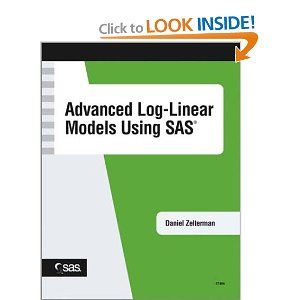Advanced Log-Linear Models Using SAS
公卫考场
Publisher: SAS Publishing (October 2, 2002)
Language: English
ISBN-10: 159047080X
ISBN-13: 978-1590470800
Product Dimensions: 10.8 x 8.4 x 0.6 inches
Daniel Zelterman applies his extensive SAS knowledge and biostatistics experience to illustrate how to use the GENMOD procedure to analyze log-linear models for categorical data. His wide variety of examples illustrate the statistical applications PROC GENMOD can perform. He thoroughly describes the models, provides real data examples, supplies the necessary code, and explains the output from GENMOD. The topics covered include: the Pearson goodness of fit statistic; tables of categorical data; a review of log-linear model methods for rectangular tables of categorical data; extrapolation methods to estimate population size; new models and distributions for statistical analysis of data; and issues in power analysis and estimating sample size in experiments. The models take advantage of the wide class of generalized linear models and use real data from pharmaceutical studies and epidemiology, wildlife, and government statistics. Statisticians who have a basic under! standing both of SAS and the analysis of categorical data will greatly benefit from this book. The discussion of each model and method emphasizes statistical aspects, such as interpretation of results, rather than programming skills. The numerous examples are used to motivate the theory and methods as they are discussed.
Preface
Acknowledgments
1 Discrete Distributions
1.1 Introduction
1.2 The Binomial Distribution
1.3 The Poisson Distribution
1.4 The Multinomial Distribution
1.5 Negative Binomial and Negative Multinomial Distributions
公卫论坛
2 Basic Log-Linear Models and the GENMOD Procedure
2.1 Introduction
2.2 Log-Linear Models for a 2x2 Table
2.3 Log-Linear Models in Higher Dimensions
2.4 Residuals for Log-Linear Models
2.5 Tests of Statistical Significance
2.6 The Likelihood Function
3 Ordered Categorical Variables
3.1 Introduction
3.2 Log-Linear Models with One Ordered Category
3.3 Two Cross-Classified Ordered Categories
4 Non-Rectangular Tables
4.1 Introduction
4.2 Independence in a Triangular Table
4.3 Interactions in a Circular Table 公卫论坛
4.4 Bradley-Terry Model for Pairwise Comparisons
5 Poisson Regression
5.1 Introduction
5.2 Poisson Regression for Mortality Data
5.3 Poisson Regression with Overdispersion
6 Finite Population Size Estimation
6.1 Introduction
6.2 A Small Example 公卫论坛
6.3 A Larger Number of Lists
7 Truncated Poisson Regression
7.1 Introduction
7.2 Mathematical Background
7.3 Truncated Poisson Models with Covariates
7.4 An Example with Overdispersion
7.5 Diagnostics and Options
8 The Hypergeometric Distribution 公卫家园
8.1 Introduction
8.2 Derivation of the Distribution
8.3 Extended Hypergoemetric Distribution
8.4 Hypergeometric Regression
8.5 Comparing Several 2x2 Tables
9 Sample Size Estimation and Power for Log-Linear Models
9.1 Introduction
9.2 Background Theory
9.3 Power for a 2x2 Table
9.4 Sample Size for an Interaction
9.5 Power for a Known Sample Size
A The Output Delivery System
B Programming Statements for Generalized Linear Models
C Additional Readings
References
公卫论坛
Index
公卫人
I really enjoyed this book, it is written assuming very little of you. Everything is thoroughly explained and easy to follow. The examples are well chosen and teach the subject well. --Andrea Wainwright, PhilaSUG Executive Committee Member
公卫论坛
The intermediate SAS user with a solid background in probability theory will benefit most from this book. Of particular help are the first two chapters, where the author lays the foundation for the discrete distributions and log-linear models. The novice reader who feels comfortable with the topics of probability and statistical distributions will benefit most from this presentation, while those with more experience will benefit from these chapters as review material. The conversational tone makes Advanced Log-Linear Models Using SAS a pleasure to read, and this newest addition to the SAS Press library a useful text for those users who need a reference text and those who need an application-oriented text. --Gregory E. Gilbert, MSPH, Dean's Office, College of Medicine, Medical University of South Carolina
This book is for knowledgeable researchers, graduate students and financial practitioners. It was refreshing to find that the authors provide a summary of each topic that explains in simple to understand language both the output from the various SAS PROCs used and the statistical interpretation with respect to the hypothesis being tested. In addition, the actual SAS code is listed, highlighted and illustrated in a way that makes it easy for people to start using SAS quickly and easily to do their financial and statistical analysis. As a working mathematician and statistician who has no formal education and limited experience in economics or the stock market, I found the book enlightening about some of the inner philosophies of economics and stock market trading practices. And for those people who are involved in such areas and who have to perform financial research, I highly recommend this book as a valuable asset to their financial tools. I especially recommend it to those people who are in the early stages of their careers, during which statistical analysis using computer software is often required. --Charles Patridge, The Hartford 公卫论坛
This is useful for intermediate SAS users with a solid probability theory background who need a reference and application-oriented text. -- Gregory E. Gilbert, MSPH, Dean's Office, College of Medicine, Medical University of South Carolina 公卫论坛
附件列表
您所在的用户组无法下载或查看附件
词条内容仅供参考,如果您需要解决具体问题
(尤其在法律、医学等领域),建议您咨询相关领域专业人士。
如果您认为本词条还有待完善,请 编辑
上一篇 王灿楠 下一篇 Analyzing Receiver Operating Characteristic Curves With SAS


